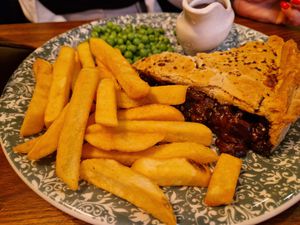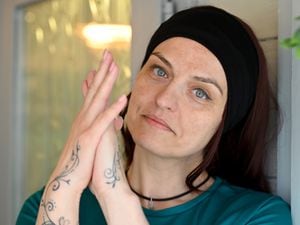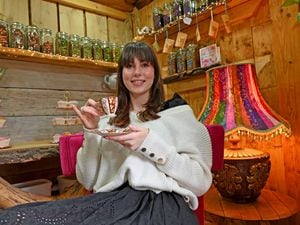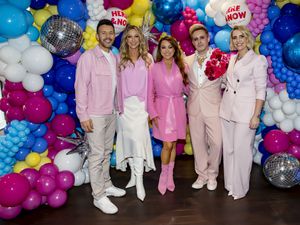Inside the poppy factory: Jobs gave us purpose again
Why it's as vital as ever to buy a poppy this November. . .
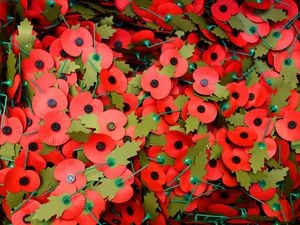
It’s long been a symbol of remembrance for the millions of soldiers who lost their lives for their country and our freedom.
Every November we pin a red poppy to our coats not just in tribute to these heroes but also to help surviving servicemen and women whose lives have been affected by conflict.
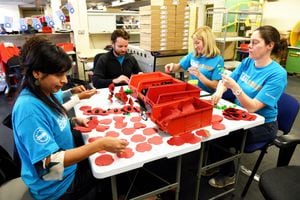
The Royal British Legion uses the million of pounds collected in donations for the Poppy Appeal to support those who have served in the armed forces along with their families.
But what people may not realise is that many of these iconic paper poppies, first inspired by John McCrae’s famous poem In Flanders Fields, are also helping veterans before they’ve even been sold.
At the Poppy Factory in London around 30 disabled veterans, their dependants, along with a small number of home-workers, work year-round to fulfil an annual order from The Royal British Legion.
More than seven million lapel poppies, 140,000 poppy wreaths and one million remembrance crosses are hand made by the team.
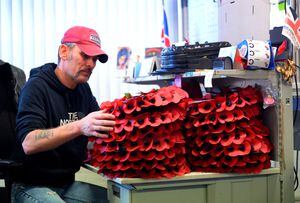
Usually almost 45 million poppies are bought by the public each year and all of those buttonholes are produced on machines at the Poppy Appeal’s HQ in Kent.
But at the factory in Richmond, lapel poppies are still made using the traditional method which was first designed by Major George Howson MC.
He founded the charity in 1922 to provide employment opportunities to wounded soldiers returning from the First World War.
As well as offering employment, the factory offers a support network for veterans helping them to get back on their feet after making the transition from military to civilian life.
Workers use a small wooden block, originally intended to allow amputees and soldiers who had lost the use of one hand, to construct the poppies.
WATCH: Inside a poppy factory
The stem is put in place first before a leaf is added on top followed by the petals and black plastic button to hold it together.
All of the plastic parts are shipped in but the petals and leaves are cut out from huge roles of paper by machines at the factory.
Workers also make remembrance wreathes, which contain around 60 poppies, and are usually specific to a particular member of the Royal Family, regiment, or memorial event.
They also produce wooden remembrance symbols such as crosses which are planted in memorial gardens around the country including the Field of Remembrance at Westminster Abbey.
Among the busy team is 48-year-old Gregg Howell who lived in Birmingham for many years and has worked at the factory since 2014.
He served in the British Army with the The Cheshire Regiment before being medically discharged in 1988.
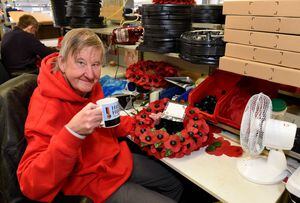
“The military has run through my family for generations including both my parents. From my childhood all I ever really dreamed about was becoming a soldier.
“Unfortunately, after joining the Army I went through some very traumatic personal experiences and had to leave the military with nothing but a formal diagnosis of post-traumatic stress disorder (PTSD).
“It left me feeling like my whole life and my dream of a military career had been shattered and broken beyond repair. Little did I know at that time, but so was I.
“After leaving the Army I had around 20 years of feeling like I didn’t have anything left to give. I couldn’t hold a job down for more than six weeks.
“I got involved in drink, drugs, crime, I eventually became a schizophrenic and I ended up being sectioned many times. I was often homeless and at one point made a serious attempt to take my own life that left me clinically dead.
“All I can say is that if it wasn’t for the military charities like The Poppy Factory supporting me and helping me change my life around, I wouldn’t be where I am today.”
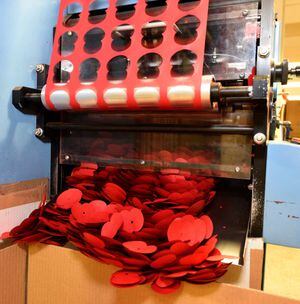
Gregg, who can make between 70 and 80 poppy wreathes a day and holds the record for 115 completed in one shift, says one of the benefits of the Poppy Factory is that everybody has been in the same boat.
“They all understand what I’ve been through as they’ve had similar experiences. No one is judging me, everyone is there for each other. The Poppy Factory has changed my life,” he says.
Once wreathes made by Gregg and other members of team are completed they are placed in boxes that are labelled with the names of the recipient and the maker.
These are then distributed across the country for remembrance events to honour those who made huge sacrifices for their country.
Alongside providing work for veterans in the factory, the charity also secures jobs for other former servicemen and women with physical and mental health challenges through its employment service Getting You Back to Work.
Since it was launched in 2010, to help those leaving the military to find jobs nearer their homes, it has already found work for 54 veterans in the West Midlands.
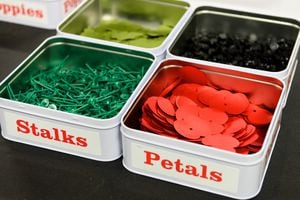
Leading the work programme is co-ordinator and former Royal Artillery Gunner Shaun Johnson, who has benefited from the charity’s support.
He served almost 12 years before being discharged from the army with a crush injury to his hand halfway through an intended 22-year career.
After leaving, Shaun struggled to adjust to civilian life, missing the support of his comrades and he developed severe mental health challenges.
“I was suffering from paranoia because I no longer knew who to trust. I was used to my soldier family having my back no matter what, that trust was automatic, I didn’t have to think. I had their back, they had mine.
“I went deep into myself. I started spending a lot of time on my own and I didn’t want people close to me,” he says.
But Shaun, who served in Northern Ireland, eventually found his way to Richmond and spent 18 months working on the factory floor to help get his life back on track.

“It gave me a purpose again. It was important for me to have a job as having a job meant pride and respect. I loved working with the team because they were like my family,” he explains.
Now he is responsible for the employment service which places former troops into a wide range of jobs that fit their skills, wherever they live in Britain.
“I can relate to these guys because I too had no idea where to start when I came out the military.
“They are frightened for the future because the life they knew has gone and they don’t know where to turn.
“I feel a sense of duty to help them because they are like me. I come into work and think ‘who can we help today?’.
“I’ve been in the same place, I’ve had the same feelings of self-doubt and fear,” says Shaun.
When veterans get in touch he tries to find out what job will suit them and says revealing that he was also in the military often helps to put them at ease.
“I ask them what’s going to make them happy and what’s going to make them jump out of bed in the morning. I tell them to write it all down however far-fetched it might seem,” says Shaun.
He then puts them in touch with one of the charity’s network of employability consultants who meets them face to face to discuss their ambitions and strengths.
They offer help with CV writing, applications and job interview practice and continue to support them once they’ve secured a job to ensure they are happy in their work.
“What I like the most about my job is that I speak to some boys and girls who are real lost souls but then, if I’m fortunate, I get to speak to them again and hear how much their lives have changed. Its that spirit of the military and that desire to help others at it’s best,” says Shaun.
In September, Birmingham father of two Danny Kitcher, aged 44, became the 1,000th to be placed in work by The Poppy Factory after starting a job as a business office analyst at Jaguar Land Rover in Coventry.
“I served for over 12 years in the British Army with the Adjutant General Corps, as Combat HR Specialist.
“Unfortunately I broke my collar bone playing football for the Army, I had to have surgery and the injuries affected my spine and nerves, causing severe pain, numbness and tingling as well as mobility issues. It was very frustrating considering how energetic I’d been.
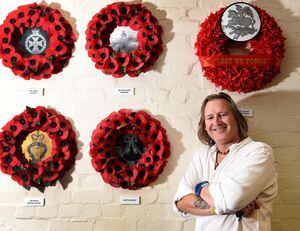
“It was a friend of mine who introduced me to The Poppy Factory. We served together and he was medically discharged too, and we talked a lot about how we could move forward.
“My employability consultant Becky was really helpful, working on my CV, linking me up with different opportunities and checking up on how I was doing.
“When I got a job at Jaguar Land Rover I was over the moon. It’s a great opportunity and I’m really enjoying it.”
The work of the Poppy Factory has changed over the years to adapt to the changing needs of those leaving the forces but the charity continues to support the vision of its founder Major Howson MC.
Along with those poppies made in Richmond, more than five million Scottish buttonholes, which have four petals and no leaf unlike those in the rest of the UK are still made by hand by disabled former servicemen at Lady Haig’s Poppy Factory in Edinburgh each year.
So when you buy your poppy for Remembrance Day you are not just honouring those who gave their lives on active service, you are also making an enormous difference to the Armed Forces community.
Pledge to get injured vets into work as strong as ever
After thousands of wounded soldiers, sailors and airmen returned from The Great War without the means of earning a living, Major George Howson MC was sure he could to do something to help.
When he opened his factory in 1922, his one dream was ‘to give the disabled their chance’.
Poppies had become popular as an icon of public remembrance through the work of Anna Guerin of France and Moina Michael of the USA, who took Lieutenant Colonel John McCrae’s famous poem, In Flanders Fields, and devised a practical way of raising vital funds for wartime charities.
The British Legion had been set up the year before and the very first Poppy Appeal – using silk poppies made by widows in France – had raised £106,000.
Major Howson saw his chance and asked Earl Haig, the founder of the British Legion if he could make the poppies for their next Poppy Appeal.
Major Howson had been given a cheque for £2,000 and used it to set up The Disabled Society with just six staff. Within 10 years, the name had changed to The Poppy Factory and Howson was employing more than 350 disabled veterans to make the poppies.
The factory moved to Richmond in 1925 and in 1928 Major Howson founded the annual Field of Remembrance at Westminster Abbey.
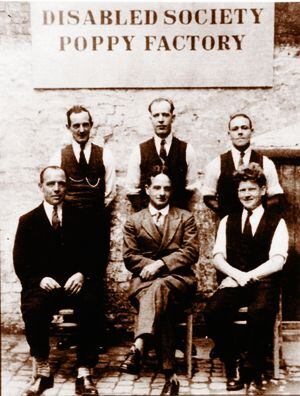
After Major Howson’s death from pancreatic cancer in 1936, his coffin was taken to The Poppy Factory and surrounded by colourful wreaths and poppies. Every worker then took his turn to hold an hour of silent vigil in memorium.
Towards the end of the century, the needs of veterans started to change.
They wanted to work in their local communities, to be closer to their families, and to utilise the wide variety of skills that they learned during their time in the armed forces.
The Poppy Factory had often been used as a stepping-stone from conflict or rehabilitation into other employment. In 2005, The Poppy Factory started supporting veterans, with physical and mental health conditions, into employment within civilian businesses around the country.
In 2010, after a few successful experiments, a formal programme to support veterans with health challenges into paid employment not just in the factory, but around the whole country – furthering Major Howsons’s original vision – was launched.
This saw employability and occupational health experts being recruited regionally and partnerships with employers forged to provide opportunities for veterans.
Her Majesty The Queen visited The Poppy Factory herself in 2012, to see first-hand how Howson’s mission to help disabled ex-service personnel is still alive to this day.
The following year, the Duchess of Cornwall became the charity’s sole patron in an effort to boost awareness of its work.
She visited the factory and met some of the disabled veterans that have been helped into civilian employment elsewhere.
Last year, the Treasury awarded The Poppy Factory £2.5 million to support the renovation of its factory.
The total cost of the project is £5.7 million and will enable it to welcome more visitors who can see the work going on inside.
While in September, the Getting You Back to Work service celebrated a milestone – since it was launched in 2010, it has helped 1,000 veterans find civilian employment. And 54 of these have been in the West Midlands.
Men and women who have been supported by The Poppy Factory were invited to a special reception hosted by HRH The Duchess of Cornwall at Clarence House in celebration.
The Poppy Factory’s chief executive Deirdre Mills said: “We cannot thank the public enough for their support in getting behind our wounded, injured and sick veterans.
“We owe our veterans a debt of gratitude and we are so proud that everyone came together to help.
“Our focus is on helping each veteran harness their own unique skills and abilities and by so doing move into long term meaningful employment. This means so much and will have a great impact upon their lives.”
But the charity estimates there are at least 20,000 wounded, injured or sick veterans of working age in the UK, who are struggling to get back into work after leaving the armed forces, and is working to reach out to more people in need of help.
Veterans who would like to find out more about The Poppy Factory’s Getting You Back to Work programme can visit www.poppyfactory.org email gybtw@poppyfactory.org or call 020 8939 1837.

